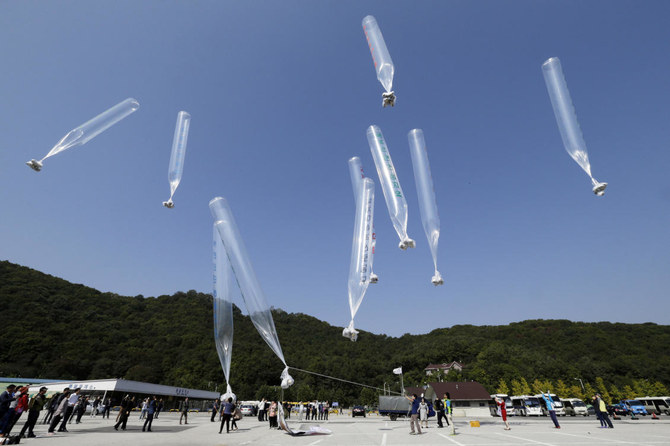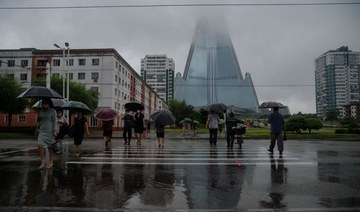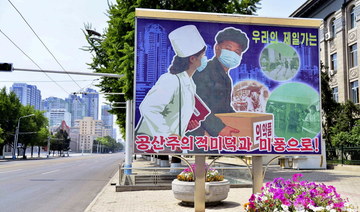SEOUL: North Korea suggested Friday its COVID-19 outbreak began in people who had contact with balloons flown from South Korea — a highly questionable claim that appeared to be an attempt to hold its rival responsible amid increasing tensions.
Activists for years have flown balloons across the border to distribute hundreds of thousands of propaganda leaflets critical of North Korean leader Kim Jong Un, and North Korea has often expressed fury at the activists and at South Korea’s leadership for not stopping them.
Global health authorities say the coronavirus is spread by people in close contact who inhale airborne droplets and it’s more likely to occur in enclosed, poorly ventilated spaces than outdoors. South Korea’s Unification Ministry said there was no chance South Korean balloons might have spread the virus to North Korea.
Ties between the Koreas remain strained amid a long-running stalemate in US-led diplomacy on persuading North Korea to abandon its nuclear ambitions in return for economic and political benefits.
The state media report said North Korea’s epidemic prevention center had found infection clusters in the town of Ipho near the southeastern border and that some Ipho residents with feverish symptoms traveled to Pyongyang. The center said an 18-year-old soldier and a 5-year kindergartener had contact with “alien things” in the town in early April and later tested positive for the omicron variant.
In what it called “an emergency instruction,” the epidemic prevention center ordered officials to “to vigilantly deal with alien things coming by wind and other climate phenomena and balloons” along the border and trace their sources to the last. It also stressed that anyone finding “alien things” must notify authorities immediately so they could be removed.
The reports did not specify what the “alien things” were. But laying the blame on things flown across the border likely is a way to repeat its objections to the ballooning activities of North Korean defectors and activists in South Korea.
Leafletting campaigns were largely halted after South Korea’s previous liberal government passed a law criminalizing them, and there were no public balloon attempts made in early April.
An activist who is standing trial for past activities flew balloons carrying propaganda leaflets across the border in late April after halting them for a year. Park Sang-hak floated balloons twice in June, switching the cargo on those attempts to COVID-19 relief items such as masks and painkillers.
Police are still investigating the recent leafleting activities by the activist, Cha Duck Chul, a deputy spokesperson at the South’s Unification Ministry, told reporters Friday.
Cha also said the consensus among South Korean health officials and World Health Organization experts is that infections via contact with the virus on the surface of materials is virtually impossible.
Analyst Cheong Seong-Chang at South Korea’s Sejong Institute said North Korea wants its people to believe the coronavirus originated from leaflets, US dollars or other materials carried across the border by the balloons.
Cheong said North Korea will likely sternly punish anyone taking such South Korean items covertly. He said North Korea could also try to shoot down incoming South Korean balloons, a move that would prompt South Korea to return fire and would sharply escalate animosities between the countries.
North Korea is infuriated by the leafletting campaign because it’s designed to undermine Kim’s authoritarian rule over a population that has little access to outside information. In 2014, North Korea fired at propaganda balloons flying toward its territory and South Korea returned fire, though there were no casualties.
Laying blame on objects flown across the inter-Korean border contradicts the outside view that the virus spread after North Korea briefly reopened its northern border with China to freight traffic in January and it surged further following a military parade and other events in Pyongyang in April.
After maintaining a widely disputed claim to be coronavirus-free for more than two years, North Korea on May 12 admitted to the COVID-19 outbreak, saying an unspecified number of people in Pyongyang tested positive for the omicron variant.
North Korea has since reported about 4.7 million fever cases out of its 26 million population but only identified a fraction of them as COVID-19. It says 73 people have died, an extremely low fatality rate. Both figures are believed to be manipulated by North Korea to keep its people vigilant against the virus and prevent any political damage to Kim.
North Korea suggests balloons flown from South brought COVID-19
https://arab.news/5ssfg
North Korea suggests balloons flown from South brought COVID-19

- In what it called “an emergency instruction,” the epidemic prevention center ordered officials to “to vigilantly deal with alien things coming by wind and other climate phenomena and balloons” along the border
Hindu-Muslim divisions sway voting in Indian district scarred by deadly riots

- Villages are largely self-segregated by religion in and around Muzaffarnagar in the most populous Uttar Pradesh state
- Violent clashes broke out in 2013 after two Hindus stabbed Muslim youth to death, accusing him of harassing their sister
MUZAFFARNAGAR: Hindu-Muslim enmity made way for peace in an Indian district that saw deadly riots a decade ago but religious divisions still influence residents who voted on Friday in general elections in which Hindu nationalism is a key theme.
Villages are largely self-segregated by religion in and around Muzaffarnagar district, in the most populous northern state of Uttar Pradesh, but people say there is no longer tension between the majority Hindu and minority Muslim communities.
Violent clashes broke out here in 2013 after two Hindus stabbed a Muslim youth to death, accusing him of sexually harassing their sister. They were later beaten to death by a Muslim mob, which sparked riots that killed about 65 people, mostly Muslims, and displaced thousands.
Violence has not returned to the district known as the country's sugarcane-belt, but political divisions remain as Hindus typically vote for Prime Minister Narendra Modi's Bharatiya Janata Party (BJP) and Muslims for the opposition.
Modi's government has "controlled Muslims", said Ramesh Chand, a Hindu biscuit baker in Kairana city near Muzaffarnagar.
Critics accuse the nationalist BJP of targeting India's 200 million minority Muslims to please their hardline Hindu base - charges they deny.
Modi is widely expected to win a third term on the back of strong growth, welfare and his personal popularity despite some concern about unemployment, price rises and rural distress.
Chand said Modi had improved security in the region. "We can live in peace, whether or not we have jobs ... We can sleep with our doors open."
There were opposing views too.
In Jaula village, sugarcane farmer Mohammed Irfan, 50, said Modi's "high-handedness against Muslims" as well as unemployment and inflation were major reasons for him voting for the opposition Samajwadi Party.
Uttar Pradesh elects 80 lawmakers to the 543-member lower house of parliament, the most among all states, and a strong showing here is critical to the nationwide outcome.
Support for Modi was visible in Kutba Kutbi village, the epicentre of the 2013 riots.
Although there is "brotherhood" between the two communities now, nearly all Muslim families left the village after the riots, said Vinay Kumar Baliyan, 43, a farmer who said he supports Modi for promoting economic growth and raising India's stature globally.
But Irfan said Muslims are expected to vote in larger numbers this time as Eid celebrations this month brought many migrant workers and students home.
After Pakistan alert, WHO likely to issue wider warning on contaminated J&J cough syrup

- The UN health body said it puts out global medical product alerts to ‘encourage diligence’ by authorities
- The WHO this week sent out alert on five batches of contaminated cough syrup ingredients found in Pakistan
LONDON: The World Health Organization is likely to issue a wider warning about contaminated Johnson and Johnson-made children’s cough syrup found in Nigeria last week, it said in an email.
Nigeria’s regulator recalled a batch of Benylin paediatric syrup last Wednesday, having found a high level of diethylene glycol in the product during routine testing.
The contaminant, alongside another closely related toxin, ethylene glycol, has been linked to the deaths of more than 300 children in Cameroon, Gambia, Indonesia and Uzbekistan since 2022, though there is no evidence that these incidents are linked with the latest recalls.
The UN health body said it puts out global medical product alerts to “encourage diligence” by national authorities and was likely to do so in this instance, “subject to confirmation of certain details from parties.”
The recalled batch of Benylin syrup was made by J&J in South Africa in May 2021, although Kenvue now owns the brand after a spin-off from J&J last year.
J&J has referred requests for comment to Kenvue. In an emailed statement on Friday, Kenvue said it had carried out tests on the batch recalled by Nigeria and had not detected either diethylene or ethylene glycol.
“We continue to work closely with health authorities and the WHO and are engaging with NAFDAC to understand their test results, including verifying the authenticity of the sampled product, the testing methodology used, and results reported by the agency,” the statement added.
Since Nigeria’s recall, five other African countries have also pulled the product from shelves — Kenya, Rwanda, Tanzania, Zimbabwe and South Africa, where the drug was made.
South Africa’s regulator has also recalled another batch of the syrup, which is used to treat coughs, hay fever and other allergic reactions in children.
Diethylene glycol is toxic to humans when consumed and can result in acute kidney failure, although there have been no reports of harm in the latest incident.
RAW MATERIALS
In the 2022 cases, the contamination in the syrups came from the raw materials used by manufacturers in India and Indonesia.
The WHO said it was collaborating with both the manufacturer and regulatory authority in South Africa to investigate the Benylin paediatric syrup, and had information on the source of the ingredients used. Kenvue has previously said it tested its ingredients before manufacture.
The agency said the possibility that the syrup was counterfeit was also “under consideration as part of investigations.”
Earlier this week the WHO sent out a separate alert on five batches of contaminated cough syrup ingredients found in Pakistan that appeared to have been falsely labelled as Dow Chemical products.
It was the first alert the WHO has sent on excipients — elements of a medicine other than the active pharmaceutical ingredient — rather than finished products, the agency confirmed on Friday.
The batches of propylene glycol were contaminated with ethylene glycol.
“It was critical for WHO to also alert manufacturers that may have been procuring this material to exercise more caution,” a WHO spokesperson said by email.
Propylene glycol is not an ingredient in Benylin paediatric syrup, a Kenvue spokesperson said on Friday.
Polish flag carrier LOT cancels Friday flights to Tel Aviv and Beirut, PAP reports

- Decisions about future flights would be made on an ongoing basis
WARSAW: Polish national airline LOT canceled flights on Friday to Tel Aviv and Beirut due to the unstable situation in the region, a spokesperson was quoted as saying by state news agency PAP.
“Today’s flight 151/152 to Israel from Warsaw and to Beirut 143/144 have been canceled,” Krzysztof Moczulski told PAP. He said decisions about future flights would be made on an ongoing basis.
French police arrest man who threatened to blow himself up at Iran’s Paris consulate

- Police verifying man’s identity and trying to determine whether he had weapons
PARIS: A man who had threatened to blow himself up at Iran’s consulate in Paris was arrested by police, a police source said.
French police earlier cordoned off the Iranian consulate, Reuters reporters saw, and did not immediately confirm finding any weapons.
A police source told Reuters the man was seen at about 11 am (0900 GMT) entering the consulate, carrying what appeared to be a grenade and explosive vest.
A Paris police official told The Associated Press that officers were verifying the man’s identity and trying to determine whether he had weapons.
Police earlier said they were at the scene and asked the public to avoid the area but provided no further details.
Service was interrupted on a nearby metro line for security reasons, the RATP metro company said.
A police cordon remained in place on Friday afternoon, but traffic was resuming in the area.
A person at the Iranian embassy who responded to a call from Reuters declined to provide any information on the situation.
It was unclear whether the incident had any link to the escalating tensions between Iran and Israel.
Earlier on Friday, explosions echoed over the Iranian city of Isfahan in what sources described as an Israeli attack, but Tehran played down the incident and indicated it had no plans for retaliation — a response that appeared gauged toward averting region-wide war.
The incident also comes as Paris is gearing up to host the summer Olympics.
* With Reuters and AP
Blinken says US ‘not involved in any offensive operation’

- ‘All I can say is for our part and for all the members of the G7 our focus is on de-escalation’
CAPRI, Italy: US Secretary of State Antony Blinken on Friday refused to comment on reports of an attack by Israel on Iran, beyond saying Washington was “not involved in any offensive operation.”
Speaking to journalists after a meeting with G7 counterparts in Italy, he declined to answer repeated questions about explosions in Iran, and reports that Israel had carried out retaliatory strikes.
“I’m not going to speak to these reported events... All I can say is for our part and for all the members of the G7 our focus is on de-escalation,” Blinken told a press conference on the island of Capri.
“The US has not been involved in any offensive operation,” he said.
Speaking to reporters earlier, G7 host Antonio Tajani, the foreign minister of Italy, said Washington had been informed in advance of the strikes, without giving details.
“The United States were informed at the last moment,” he said, adding that “it was just information” passed on — without saying who by.
The reports dominated the G7 Friday, with Tajani forced to change the agenda, but little public information emerged.
In its final statement, the Group of Seven ministers said: “In light of reports of strikes on April 19th, we urge all parties to work to prevent further escalation. The G7 will continue to work to this end.”
Israel had warned it would hit back after Iran fired hundreds of missiles and drones at Israel almost a week ago, in retaliation for a deadly strike — which Tehran blamed on its foe — that levelled Iran’s consular annex at its embassy in Syria.


















